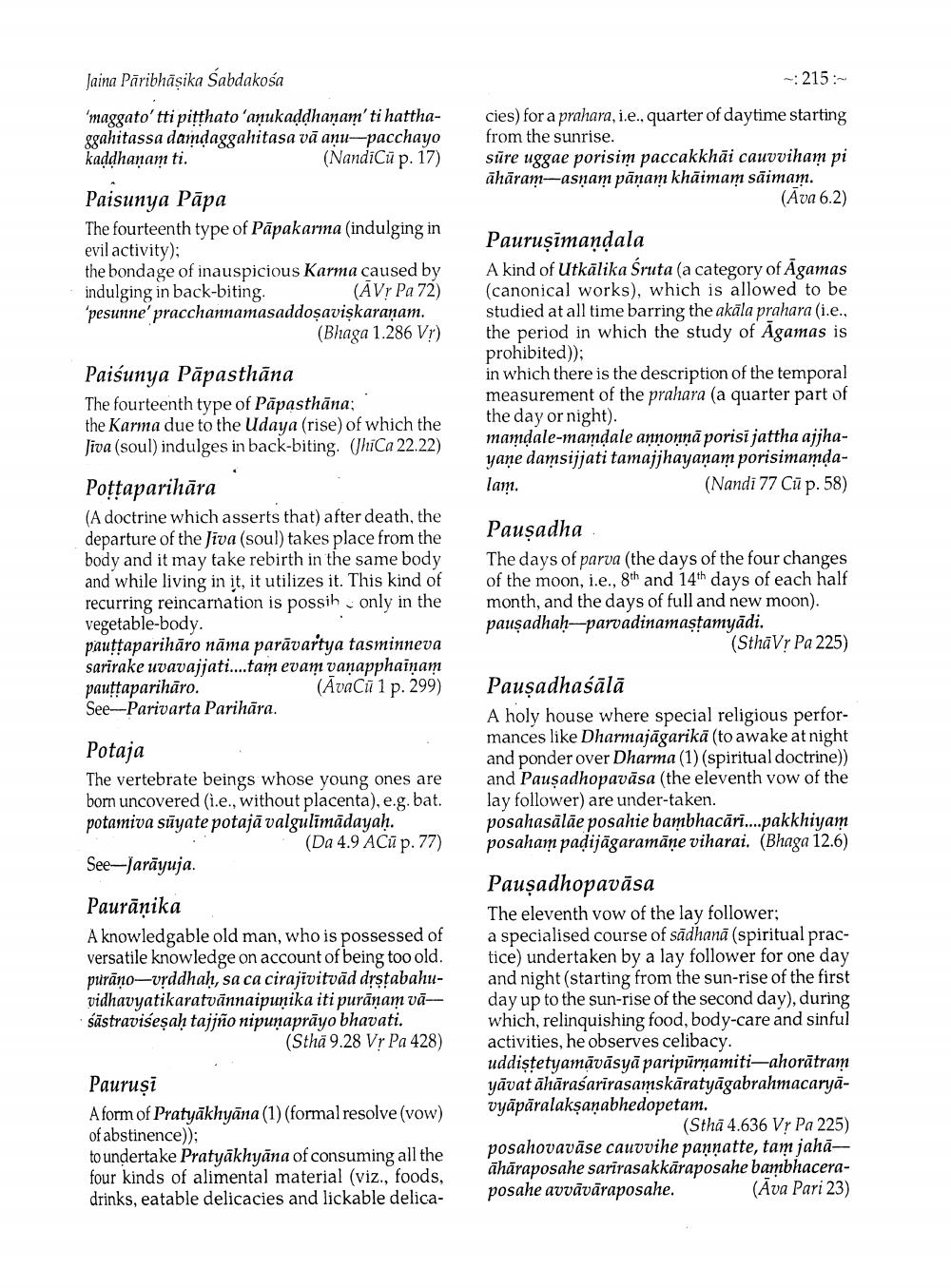________________
Jaina Pīribhāṣika Sabdakosa
215
'maggato' tti pitthato'anukaddhanam' ti hatthaggahitassa damdaggahitasa vā anu-pacchayo kaddhanam ti.
(NandiCü p. 17)
cies) for a prahara, i.e., quarter of daytime starting from the sunrise. sūre uggae porisim paccakkhāi cauvviham pi āhāram-asnam pāņam khāimam sāimam.
(Āva 6.2)
Paisunya Papa The fourteenth type of Pāpakarma (indulging in evil activity); the bondage of inauspicious Karma caused by indulging in back-biting.
(AV! Pa 72) "pesunne' pracchannamasaddoşavişkaraṇam.
(Bhaga 1.286 Vr)
Paurusimandala A kind of Utkālika Śruta (a category of Agamas (canonical works), which is allowed to be studied at all time barring the akāla prahara (i.e., the period in which the study of Agamas is prohibited)); in which there is the description of the temporal measurement of the prahara (a quarter part of the day or night). mamdale-mamdale annoņnā porisi jattha ajjhayane damsijjati tamajjhayanam porisimamda
(Nandi 77 Cū p. 58)
lain.
Paisunya Pāpasthāna The fourteenth type of Pāpasthāna; the Karma due to the Udaya (rise) of which the Jiva (soul) indulges in back-biting. (JhiCa 22.22) Pottaparihāra (A doctrine which asserts that) after death, the departure of the Jiva (soul) takes place from the body and it may take rebirth in the same body and while living in it, it utilizes it. This kind of recurring reincarnation is possih only in the vegetable-body. pauttaparihāro nāma parāvartya tasminneva sarirake uvavajjati....tam evam vanapphainam pauttaparihāro.
(ĀvaCū 1 p. 299) See-Parivarta Parihāra.
Pauşadha The days of parva (the days of the four changes of the moon, i.e., 8th and 14th days of each half month, and the days of full and new moon). pausadhah--parvadinamastamyādi.
(SthāV? Pa 225)
Potaja The vertebrate beings whose young ones are born uncovered (i.e., without placenta), e.g. bat. potamiva sūyate potajā valgulimādayah.
(Da 4.9 ACū p. 77) See-Jarāyuja.
Pausadhaśālā A holy house where special religious performances like Dharmajāgarikā (to awake at night and ponder over Dharma (1) (spiritual doctrine)) and Pausadhopavāsa (the eleventh vow of the lay follower) are under-taken. posahasālāe posahie bambhacāri....pakkhiyam posaham padijāgaramāṇe viharai. (Bhaga 12.6)
Paurāņika A knowledgable old man, who is possessed of versatile knowledge on account of being too old. purāņo-vrddhah, sa ca cirajivitvād drşțabahuvidhavyatikaratvānnaipunika iti purāņam vāsästravićeṣaḥ tajjño nipuņaprāyo bhavati.
(Stha 9.28 Vr Pa 428)
Pauṣadhopavāsa The eleventh vow of the lay follower; a specialised course of sādhanā (spiritual practice) undertaken by a lay follower for one day and night (starting from the sun-rise of the first day up to the sun-rise of the second day), during which, relinquishing food, body-care and sinful activities, he observes celibacy. uddistetyamāvāsyā paripurņamiti-ahorātram yāvat āhāraśarīrasamskāratyāgabrahmacaryāvyāpāralakṣaṇabhedopetam.
(Sthā 4.636 Vr Pa 225) posahovavāse cauðvihe pannatte, tam jahāāhāraposahe sarirasakkāraposahe bambhaceraposahe avvāvāraposahe. (Ava Pari 23)
Paurusi A form of Pratyākhyāna (1) (formal resolve (vow) of abstinence)); to undertake Pratyākhyāna of consuming all the four kinds of alimental material (viz., foods, drinks, eatable delicacies and lickable delica




